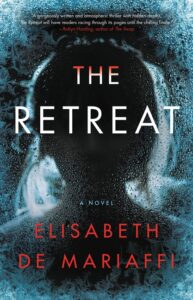There’s nothing quite as relaxing as spending time in the great outdoors, is there? Or… is there?
A little over ten years ago, I signed up for a few weeks at the Banff Centre for the Arts, an arts residency high in the Rocky Mountains. It sounds ideal—all that fresh air, and so few distractions! But I’m a city girl. Once I got there, I was surprised and sometimes overwhelmed by the landscape around me, and I wasn’t the only one. You’d think the mountains would give you a feeling of liberty, possibility, wide open space. In reality, I found myself in a bowl, tall peaks on all sides. Instead of feeling on top of the world, I felt crushed by it.
It was late October when I arrived: in Banff, that means elk mating season, and bull elks do not come to play. Residency organizers explained that the elk, which freely wandered all over the residency campus, should be avoided at all cost. On campus, and on the road down to town, signs warned of other clear and present dangers: falling rock, moose, and above all, bears. It’s enough to keep you indoors, safe at your writing desk.
And then there are the dreams. I woke one night with the frightening feeling that something was looming over me. Over breakfast the next day, another writer explained that these dreams—and, in fact, nightmares explicitly about a bear—were common in the region. She’d been to the residency once before and woke one night to find every single member of her cohort sitting up in the common room. They’d all had the same nightmare, about— you guessed it— a bear looming over their beds.
When I set out to write The Retreat, I knew only a handful of things about the story: that it would revolve around a dancer with a damaged body and a damaging emotional past—that is, an artist who has to put herself back together, both in body and in soul. I knew that she would go to nature to heal. Or, at least, that was her plan.
But nature can be a monster. I wanted there to be not one, but two constant and competing threats: the humans around Maeve, and the natural world around her, too. It helped to think of other books that use monstrous nature not only as a setting—but as a true character in the story. These are some of my favourites.
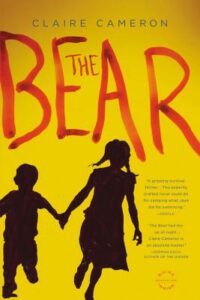
The Bear by Claire Cameron
Based loosely around a real-life bear attack that occurred in Canada’s Algonquin Park, this harrowing suspense novel imagines the incident from the point of view of a fictional survivor—five-year old Anna, left to care for her brother in the wilderness after both her parents are killed. Abandoned on the small island where the family had been camping, Anna and her brother are of course not quite alone—the bear is still out there, too.
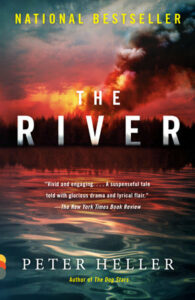
The River by Peter Heller
There’s the threat of a bear in this wilderness thriller, too—but here it’s the humans who pose the biggest danger. Jake and Wynn are Dartmouth students on a month-long canoe trip in the far north when they hear a couple—a man and a woman—arguing loudly through the fog. When they realize that a distant forest fire is chasing them down, the two young men go back to try and warn the couple—but find only the man, alone. The woman has gone missing in the wild. Days from civilization, and with the fire bearing down, Jack and Wynn have to fight to survive in this tense nail-biter.
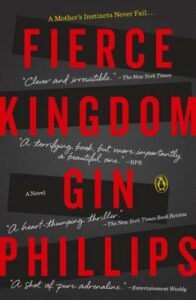
Fierce Kingdom by Gin Phillips
Wild animals are again a theme in this suspense novel about Joan, a mother on what seems like a regular afternoon trip to the zoo with her young son—until a shooter comes through the gate just before closing time. Joan has to use her knowledge of the zoo’s pathways and exhibits to survive a deadly game of hide-and-seek—keeping herself and her four-year old safe from a gunman who is hunting humans.
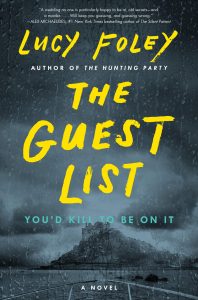
The Guest List by Lucy Foley
Moving on to weather, it’s a storm at sea that provides the natural threat in Foley’s twisty, turny thriller about a wedding gone wrong. Set at a day-resort on a picturesque island just off the coast of Ireland, the story begins with a ferry crossing in ideal weather—but by that evening, a fierce storm has rolled in off the Atlantic, and one of the guests is dead.
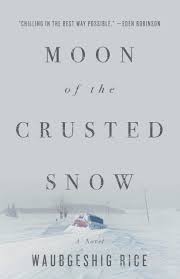
Moon of the Crusted Snow by Waubgeshig Rice
I loved the pulsing, slow-burn suspense in this novel about a northern Indigenous community facing an apocalyptic winter storm. With the power gone and food supplies dwindling, the community is cut off from the rest of society and residents don’t know if the storm has only affected their part of the world—or if the rest of the country is buried, too. When an uninvited stranger shows up, escaping the crumbling society to the south, things take a turn for the worse.
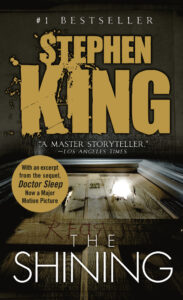
The Shining by Stephen King
I probably thought about this classic novel more than any other story when I was writing The Retreat. I wanted the same intense, claustrophobic feel of the mountain lodge; I wanted my characters to be just as trapped by the heavy snow as they were by their own anxiety. In The Shining, writer Jack Torrance moves his wife and son to the Overlook Hotel in Colorado so he can take a job as winter caretaker, hoping the solitude will help him crack his writer’s block. Once there, they are trapped by a snowstorm, and while his son’s psychic abilities lead him to see the hotel’s horrific past— it’s Jack who unravels, leaving both wife and son in serious danger.
***


